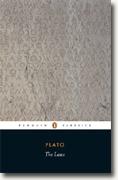Plato, trans. Trevor J. Saunders
book reviews:
· general fiction
· chick lit/romance
· sci-fi/fantasy
· graphic novels
· nonfiction
· audio books
· author interviews
· children's books @
curledupkids.com
· DVD reviews @
curledupdvd.com
newsletter
win books
buy online
links
home
for authors
& publishers
for reviewers

 |
The Laws Plato, trans. Trevor J. Saunders Penguin Classics Paperback 560 pages June 2005 |
|
In the Republic, Plato (using his dead mentor Socrates as a mouthpiece) outlined his idea for the ideal city. The Republic is generally considered the earliest example of a utopian philosophy. The ideal city, in Plato’s view, would be ruled by a benevolent dictator, a “philosopher-king” who would be shielded from corruption but a great number of constraints on his personal freedom. Plato was antagonistic towards democracy, fearing, with some justification, the rule of the mob. It was a democratic vote, after all, that sentenced Socrates to death in 399 B.C., on the charge that Socrates corrupted the youth of Athens and introduced new gods. In general, though, it is recognized that what Plato called “democracy” would be better understood by the modern ear as “anarchy”: the extreme freedom and equality in which “‘there’s no compulsion either to exercise authority if you are capable of it, or to submit to authority if you don’t want to; you needn’t fight if there’s a war, or you can wage a private war in peacetime if you don’t like peace; and if there’s any law that debars you from political or judicial office, you will none the less take either if they come your way” (Republic). We should also remember that Athenian democracy really was the direct participation of its citizens (as the Greek words demo-cracy imply) and therefore unlike modern democracies, where the power and participation of individuals is mediated by elected representatives.
At the end of his life Plato wrote a kitchen-sink book (or maybe several books that have come down to us as a single work) that tried to summarize a lifetime of political philosophizing. There is a great deal of dross in the Laws (and some of the material, some scholars argue, is probably spurious), and the minutiae it contains can dissuade even the hardiest reader from carrying on. Those interested in the heart of the matter would be well advised to read selections, as in Keith Quincy’s recent Plato Unmasked. One of the key points of the Laws, though, is Plato’s moderation of his opinion of democracy. There’s still a distinct hierarchy in the rule of law and the administration of justice, but this is now spread out among a group of “great men”: Whether it is a matter of art, music or politics, it is only the ‘best men’ who are capable of true judgment. The true judge must not allow himself to be influenced by the gallery nor intimidated by the clamor of the multitude. Nothing must compel him to hand down a verdict that belies his own convictions. It is his duty to teach the multitude and not to learn from them.If one looks at the United States’ system of government with a clear eye, at least some of the material in the Laws describes our situation: the masses are to be guided by shepherds who are wiser and more refined than we are. This empirical evidence perhaps argues against the soundness of both Plato’s and our own system of governance. Although our elected representatives ostensibly enact the will of their constituents it is common knowledge that they usually act in spite of us and instead deploy the will of the rich, i.e., the corporate interests that fund their election campaigns. In other words, the “good men” of our times are CEOs and others who work for the interest of themselves and their (comparatively few) shareholders. But it is exactly this conflict of interest, and how to safeguard against it, that Plato struggled with over his long career. And it is precisely this struggle that make Plato’s works on political philosophy worth reading today, despite their sometimes strange obsession with minutiae and anti-democratic ideas. © 2005 by Brian Charles Clark for curledup.com. |
Also by Plato:
|
|
|
|
 Click here to learn more about this month's sponsor! |
|
| fiction · sf/f · comic books · nonfiction · audio newsletter · free book contest · buy books online review index · links · · authors & publishers reviewers |
|
| site by ELBO Computing Resources, Inc. | |
 Written about 390 B.C., the Laws argues that the ideal city would ban music, theater and art, replacing such activities with a rigorous system of public education for both men and women. This latter idea was radical in Plato’s time. He got the opportunity to try out his political philosophy in Syracuse, working, basically, as a consultant to the king of that island kingdom. Plato failed miserably, and apparently spent several years in prison for his screw up.
Written about 390 B.C., the Laws argues that the ideal city would ban music, theater and art, replacing such activities with a rigorous system of public education for both men and women. This latter idea was radical in Plato’s time. He got the opportunity to try out his political philosophy in Syracuse, working, basically, as a consultant to the king of that island kingdom. Plato failed miserably, and apparently spent several years in prison for his screw up.